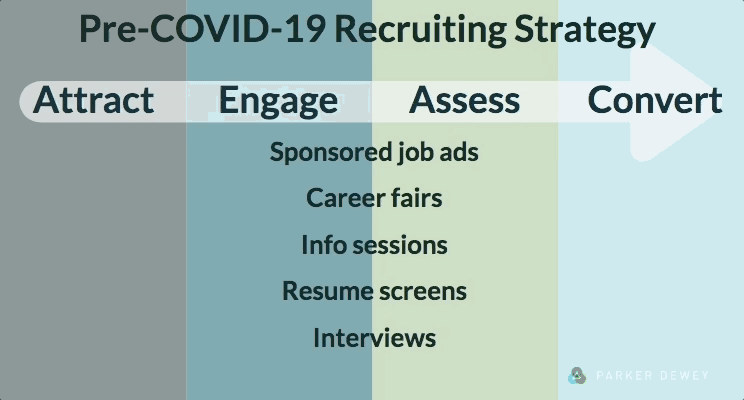
Why Year-Round Recruiting is More Effective Than Seasonal Recruiting
Campus recruiting shouldn’t occur in just one season, and in the future it won’t.
Traditional seasonal recruiting leads to companies having to filter through thousands of candidates in just a short number of weeks, making the process rushed and stressful. On the other hand, recruiting throughout the year has countless benefits.
Not only does it lead to better hiring decisions, but it also eliminates the unnecessary pressures that result from trying to pack campus recruiting into a few months. Instead of rushing to scan resumes, conduct phone screens, and host events to build the “right” pipeline of potential candidates, you can start the process with a curated pool of college students who have already demonstrated their skills and are excited about internships and full-time opportunities with your companies.
And since hiring managers value the on-demand support to complete tasks that aren’t the best use of their time (but are perfect for a college student), they are happy to provide these opportunities - while it’s supporting your efforts, hiring managers view it as a perk.
You can read more about The Future of Campus Recruiting in my recent blog post!
Jeffrey Moss, Founder and CEO
Articles of the Week
What Does It Mean to Always Be Recruiting? - ERE
For younger job seekers, diversity and inclusion in the workplace aren’t a preference. They’re a requirement. - The Washington Post
COVID-19 shows why it’s time to finally end unpaid college internships - The Conversation
Overcoming the 9% Problem: New Ways to Unleash Alumni Social Capital at Colleges - EdSurge
What Does It Mean to Always Be Recruiting? - ERE
“The point is that good recruiters are always forecasting and thinking ahead for upcoming roles. We’re connecting and networking with individuals who may not be a fit for our current openings but who we want to keep in our pipelines for the future or connect to an immediate opening.”
Campus recruiters are finding that year-round recruiting approaches actually make their roles easier, and provides a competitive advantage in achieving their goals. It also creates a powerful way to engage volunteers and hiring managers in the process as they have projects that are great for college students not just during the summer.
Related reading: Why year-round internships are a smart move
For younger job seekers, diversity and inclusion in the workplace aren’t a preference. They’re a requirement. - The Washington Post
“Career counselors say that even a year ago, students were reluctant to ask hiring managers about diversity and inclusion. They didn’t want to appear difficult or seem to be seeking special treatment. But as the national conversation has shifted, so has student confidence.”
Job seekers are prioritizing diversity in their job search, especially after this past summer’s protests. If a company’s DEI strategy does not measure up to young peoples’ expectations, they are likely to decline job offers. On top of that, younger populations are quick to recognize if a company is simply performing diversity initiatives rather than genuinely carrying them out.
Related reading: In Corporate Reckoning, Executives Pressed to Improve Racial Equity in Workplaces
COVID-19 shows why it’s time to finally end unpaid college internships - The Conversation
“Consider that students today must deal with the constant stress of a deadly virus. They also must face isolation wrought by constantly changing campus policies and online coursework. On top of that, they must figure out how to pay for their grocery, rent and tuition bills.”
Unpaid internships are inaccessible to low- and middle-income students because they cannot afford to go a summer without pay. Since companies value internship experience, these students have difficulty finding a well-paying job after graduation. This problem has been made more pressing by the pandemic, which has not only caused mass unemployment but also increased economic challenges for people already struggling.
Related reading: How paid Micro-Internships can position you for career success
Overcoming the 9% Problem: New Ways to Unleash Alumni Social Capital at Colleges - EdSurge
“The tools we found from our research are starting to help to take the chance out of chance encounters between students and alumni by creating more frequent and deliberate touch points throughout a student’s journey and scaling the number of ways alumni can engage.”
Despite the estimate that half of jobs are gained through alumni networks, only 9% of college graduates actually found their alumni network helpful in finding a job. This article provides three solutions to improve this statistic, including alumni offering Micro-Internships to students at their alma mater.
Related reading: Reconsidering Career Services: Building relationships between students, alumni, and faculty to drive improved outcomes
For more stories and insights on HR, diversity and inclusion, and hiring, click here to subscribe to our weekly newsletter Hire Learnings


.png)
-1.png)
